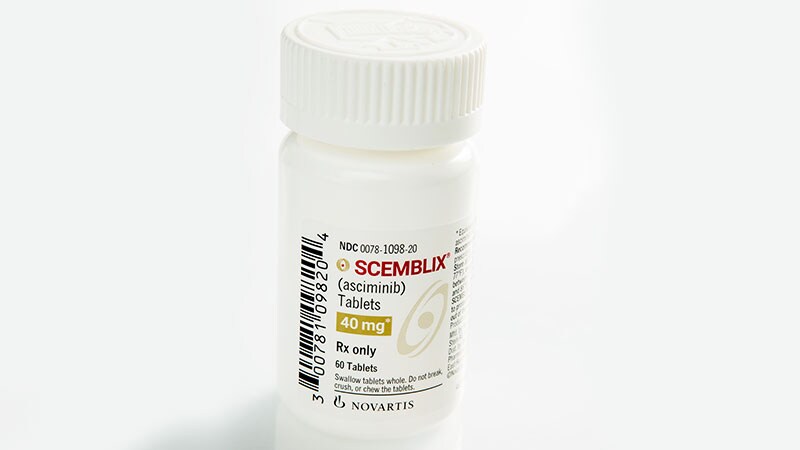Chronic myeloid leukemia (CML) is typically treated with tyrosine kinase inhibitors (TKIs) such as imatinib (Gleevec) and similar agents, but some patients cannot tolerate these drugs, and for others these drugs eventually stop working, as the tumor cells develop resistance to them.
Some of these patients may now find benefit from asciminib (Scemblix, Novartis), a new drug just approved by the US Food and Drug Administration (FDA). Asciminib has a novel mechanism of action, acting as a STAMP (Specifically Targeting the ABL Myristoyl Pocket) inhibitor.
The FDA has approved asciminib for two specific indications:
-
Use in adult patients with Philadelphia chromosome-positive CML in chronic phase (Ph+ CML-CP), previously treated with two or more TKIs; this is an accelerated approved, based on major molecular response rate at 24 weeks from the phase 3 ASCEMBL (NCT03106779) trial.
-
Use in adult patients with Ph+ CML-CP with the T315I mutation; this is a full approval, based on data from the phase I (NCT02081378) study.
Commenting on the new approval, Lee Greenberger, chief scientific officer at the Leukemia & Lymphoma Society, said that asciminib “may offer hope to patients by addressing gaps in CML care.”
“CML can be difficult to treat when currently available treatments fail patients, when treatment side effects cannot be tolerated, or sometimes both,” commented Michael J. Mauro, MD, hematologist and leader of the Myeloproliferative Neoplasms Program at Memorial Sloan Kettering Cancer Center in New York City. He was a lead investigator on the ASCEMBL trial.
“The addition of asciminib into the CML treatment landscape gives us a novel approach to combat this blood cancer, helping address clinical challenges in patients struggling after switching to a second treatment, as well as in patients who develop the T315I mutation and face significantly worse outcomes,” he commented in a press release from the manufacturer.
Clinical Trial Data
The phase 3 ASCEMBL trial was conducted in 232 patients with Ph+ CML-CP who had experienced resistance or intolerance to at least two TKIs, and who then received third-line treatment with either asciminib (n = 156) or bosutinib (Bosulif, n = 76).
The results show that the major molecular response at 24 weeks was nearly doubled by asciminib, at 25% vs 13% with bosutinib.
When results from this trial were presented at last year’s annual meeting of the American Hematological Society, clinicians welcomed the findings. “The responses looked very encouraging for this group of heavily pretreated patients,” commented Gabriela S. Hobbs, MD, clinical director of leukemia services at Boston’s Mass General Cancer Center, Massachusetts
“Although CML patients do very well on current therapies, those who don’t get a response with TKI remain a difficult clinical challenge,” she added.
“This is the first study comparing asciminib to a TKI directly (in this case bosutinib) and it showed safety as well as preliminary evidence of efficacy. I look forward to seeing additional studies with this promising drug and to have a new drug to add to the CML arsenal,” she added.
Fewer patients on asciminib discontinued treatment because of adverse reactions (7% asciminib vs 25% with bosutinib).
The most common (incidence ≥ 20%) adverse reactions and laboratory abnormalities in the asciminib arm were, respectively: upper respiratory tract infections and musculoskeletal pain; decrease in platelet and neutrophil counts, decrease in hemoglobin; increase in triglycerides, creatine kinase, and alanine aminotransferase (ALT), according to the manufacturer.
For more from Medscape Oncology, join us on Twitter and Facebook
